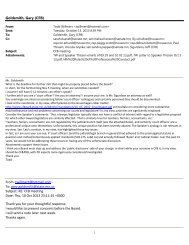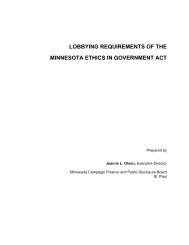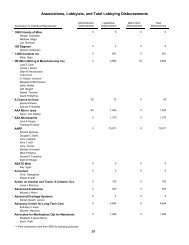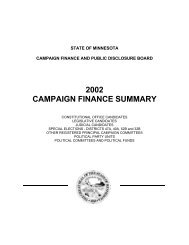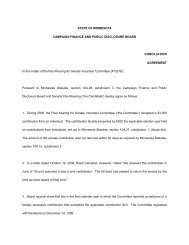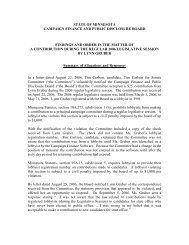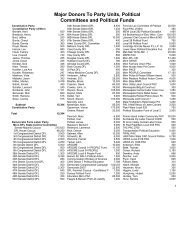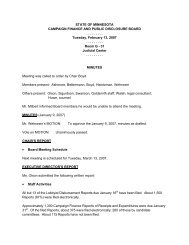2004 CAMPAIGN FINANCE SUMMARY - Minnesota Campaign ...
2004 CAMPAIGN FINANCE SUMMARY - Minnesota Campaign ...
2004 CAMPAIGN FINANCE SUMMARY - Minnesota Campaign ...
Create successful ePaper yourself
Turn your PDF publications into a flip-book with our unique Google optimized e-Paper software.
EXECUTIVE <strong>SUMMARY</strong> - ELECTION YEAR <strong>2004</strong><br />
The <strong>Campaign</strong> Finance and Public Disclosure Board is charged with the administration of the Ethics in<br />
Government Act, <strong>Minnesota</strong> Statutes Chapter 10A. During an election year campaign committees of<br />
candidates who file for office are required to file three Reports of Receipts and Expenditures: pre-primary,<br />
pre-general, and year-end. <strong>Campaign</strong> committees of candidates whose office is not up for election and<br />
candidates who chose not to file for office, file one year-end report. Offices open for election in <strong>2004</strong><br />
were: House of Representatives and certain Judicial seats. Political party units, political committees, and<br />
political funds that attempt to influence state elections also filed pre-primary, pre-general, and year-end<br />
reports.<br />
This summary is based on reports for election year <strong>2004</strong>, as filed with the Board by principal campaign<br />
committees of candidates for 134 state representative seats (311 candidates filed), 38 candidates for<br />
elective judicial seats, and a special election in Senate District 37. Additionally, this summary includes<br />
data supplied by 4 constitutional officeholders; 67 senate officeholders; 7 judicial officeholders; 18 judicial<br />
candidates; 442 committees of candidates who did not file for election in <strong>2004</strong>; 343 political party units;<br />
and 381 political committees and political funds. Comparison of total data from election year <strong>2004</strong> by<br />
principal campaign committees, political committees, or political funds with similar data from election<br />
years 2000 and 2002 is included in this summary. The data has not been verified or audited.<br />
This summary includes, for each candidate committee, political party unit, political committee or political<br />
fund, total contributions received; total transfers to candidates, committees, or funds; total expenditures;<br />
beginning and ending cash balances; and the total amount of public subsidy received by qualifying<br />
candidates. Outstanding loans payable, unpaid bills, or disbursements other than campaign expenditures<br />
or transfers to candidates are not itemized in the summary but are reflected in the totals reported in the<br />
summary.<br />
<strong>Campaign</strong> committees for constitutional and legislative office must abide by certain contribution limits.<br />
There is no contribution limit for elective judgeship candidates. House candidates reported receiving a<br />
total of $4,592,793 from individuals, lobbyists, political committees and political funds; and $569,993 from<br />
political parties (see page12) A total of $440,057 in contributions were reported received by 38 judicial<br />
candidates (see page 27). A listing of the names of individuals, committees, or funds contributing in<br />
aggregate more than $100 to legislative or district court candidates and more than $200 to constitutional<br />
office candidates and a list of contributors to political party units, political committees and political funds<br />
begins on page 51.<br />
Included in the total contributions received by House of Representative candidates were 5,823 donations<br />
of more than $100 each totaling $2,106,401 (41% of total contributions received). Judicial candidates<br />
received contributions from 513 donations of more than $100 each totaling $284,628 (65% of total<br />
contributions received).<br />
Most candidates voluntarily agree to limit expenditures in order to receive public subsidies. These<br />
subsidies include direct payments to eligible candidates during election years and the right to participate<br />
in the Political Contribution Refund (PCR) program. Agreements to abide by spending limits in order to<br />
receive money from the State Elections <strong>Campaign</strong> Fund were signed by 97% of registered house of<br />
representative candidates filing for office. A total of $1,736,164 in public subsidy was distributed to 267<br />
eligible house of representative candidates.<br />
<strong>Campaign</strong> expenditures are made for the purpose of influencing the nomination or election of a candidate<br />
and apply toward the expenditure limit applicable to partisan candidates who signed a Public Subsidy



